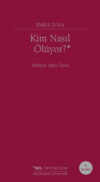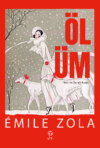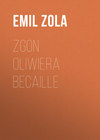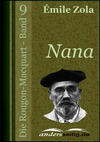Kitabı oku: «A Love Episode», sayfa 13
"You won't be angry, mamma? I'm doing my best. Why, I'm at my third bit of bread! Are you pleased?"
"Yes, my darling, quite pleased. Oh! you don't know all the joy the sight gives me!"
And then, in the happiness with which she overflowed, Helene forgetfully leaned against Henri's shoulder. Both laughed gleefully at the child, but over her face there suddenly crept a sullen flush; she gazed at them stealthily, and drooped her head, and refused to eat any more, her features glooming the while with distrust and anger. At last they had to lay her back in bed again.
CHAPTER XIII
Months slipped away, and Jeanne was still convalescent. August came, and she had not quitted her bed. When evening fell she would rise for an hour or two; but even the crossing of the room to the window – where she reclined on an invalid-chair and gazed out on Paris, flaming with the ruddy light of the dying sun – seemed too great a strain for her wearied frame. Her attenuated limbs could scarce bear their burden, and she would declare with a wan smile that the blood in her veins would not suffice for a little bird, and that she must have plenty of soup. Morsels of raw meat were dipped in her broth. She had grown to like this mixture, as she longed to be able to go down to play in the garden.
The weeks and the months which slipped by were ever instinct with the same delightful monotony, and Helene forgot to count the days. She never left the house; at Jeanne's side she forgot the whole world. No news from without reached her ears. Her retreat, though it looked down on Paris, which with its smoke and noise stretched across the horizon, was as secret and secluded as any cave of holy hermit amongst the hills. Her child was saved, and the knowledge of it satisfied all her desires. She spent her days in watching over her return to health, rejoicing in a shade of bright color returning to her cheeks, in a lively look, or in a gesture of gladness. Every hour made her daughter more like what she had been of old, with lovely eyes and wavy hair. The slower Jeanne's recovery, the greater joy was yielded to Helene, who recalled the olden days when she had suckled her, and, as she gazed on her gathering strength, felt even a keener emotion than when in the past she had measured her two little feet in her hand to see if she would soon be able to walk.
At the same time some anxiety remained to Helene. On several occasions she had seen a shadow come over Jeanne's face – a shadow of sudden distrust and sourness. Why was her laughter thus abruptly turned to sulkiness? Was she suffering? was she hiding some quickening of the old pain?
"Tell me, darling, what is the matter? You were laughing just a moment ago, and now you are nearly crying! Speak to me: do you feel a pain anywhere?"
But Jeanne abruptly turned away her head and buried her face in the pillow.
"There's nothing wrong with me," she answered curtly. "I want to be left alone."
And she would lie brooding the whole afternoon, with her eyes fixed on the wall, showing no sign of affectionate repentance, but plunged in a sadness which baffled her forlorn mother. The doctor knew not what to say; these fits of gloom would always break out when he was there, and he attributed them to the sufferer's nervousness. He impressed on Helene the necessity of crossing her in nothing.
One afternoon Jeanne had fallen asleep. Henri, who was pleased with her progress, had lingered in the room, and was carrying on a whispered conversation with Helene, who was once more busy with her everlasting needlework at her seat beside the window. Since the terrible night when she had confessed she loved him both had lived on peacefully in the consciousness of their mutual passions, careless of the morrow, and without a thought of the world. Around Jeanne's bed, in this room that still reverberated with her agony, there was an atmosphere of purity which shielded them from any outburst. The child's innocent breath fell on them with a quieting influence. But as the little invalid slowly grew well again, their love in very sympathy took new strength, and they would sit side by side with beating hearts, speaking little, and then only in whispers, lest the little one might be awakened. Their words were without significance, but struck re-echoing chords within the breast of each. That afternoon their love revealed itself in a thousand ways.
"I assure you she is much better," said the doctor. "In a fortnight she will be able to go down to the garden."
Helene went on stitching quickly.
"Yesterday she was again very sad," she murmured, "but this morning she was laughing and happy. She has given me her promise to be good."
A long silence followed. The child was still plunged in sleep, and their souls were enveloped in a profound peace. When she slumbered thus, their relief was intense; they seemed to share each other's hearts the more.
"Have you not seen the garden yet?" asked Henri. "Just now it's full of flowers."
"The asters are out, aren't they?" she questioned.
"Yes; the flower-bed looks magnificent. The clematises have wound their way up into the elms. It is quite a nest of foliage."
There was another silence. Helene ceased sewing, and gave him a smile. To their fancy it seemed as though they were strolling together along high-banked paths, dim with shadows, amidst which fell a shower of roses. As he hung over her he drank in the faint perfume of vervain that arose from her dressing-gown. However, all at once a rustling of the sheets disturbed them.
"She is wakening!" exclaimed Helene, as she started up.
Henri drew himself away, and simultaneously threw a glance towards the bed. Jeanne had but a moment before gripped the pillow with her arms, and, with her chin buried in it, had turned her face towards them. But her eyelids were still shut, and judging by her slow and regular breathing, she had again fallen asleep.
"Are you always sewing like this?" asked Henri, as he came nearer to Helene.
"I cannot remain with idle hands," she answered. "It is mechanical enough, but it regulates my thoughts. For hours I can think of the same thing without wearying."
He said no more, but his eye dwelt on the needle as the stitching went on almost in a melodious cadence; and it seemed to him as if the thread were carrying off and binding something of their lives together. For hours she could have sewn on, and for hours he could have sat there, listening to the music of the needle, in which, like a lulling refrain, re-echoed one word that never wearied them. It was their wish to live their days like this in that quiet nook, to sit side by side while the child was asleep, never stirring from their places lest they might awaken her. How sweet was that quiescent silence, in which they could listen to the pulsing of hearts, and bask in the delight of a dream of everlasting love!
"How good you are!" were the words which came several times from his lips, the joy her presence gave him only finding expression in that one phrase.
Again she raised her head, never for a moment deeming it strange that she should be so passionately worshipped. Henri's face was near her own, and for a second they gazed at one another.
"Let me get on with my work," she said in a whisper. "I shall never have it finished."
But just then an instinctive dread prompted her to turn round, and indeed there lay Jeanne, lowering upon them with deadly pale face and great inky-black eyes. The child had not made the least movement; her chin was still buried in the downy pillow, which she clasped with her little arms. She had only opened her eyes a moment before and was contemplating them.
"Jeanne, what's the matter?" asked Helene. "Are you ill? do you want anything?"
The little one made no reply, never stirred, did not even lower the lids of her great flashing eyes. A sullen gloom was on her brow, and in her pallid cheeks were deep hollows. She seemed about to throw back her hands as though a convulsion was imminent. Helene started up, begging her to speak; but she remained obstinately stiff, darting such black looks on her mother that the latter's face became purple with blushes, and she murmured:
"Doctor, see; what is the matter with her?"
Henri had drawn his chair away from Helene's. He ventured near the bed, and was desirous of taking hold of one of the little hands which so fiercely gripped the pillow. But as he touched Jeanne she trembled in every limb, turned with a start towards the wall, and exclaimed:
"Leave me alone; you, I mean! You are hurting me!"
She pulled the coverlet over her face, and for a quarter of an hour they attempted, without success, to soothe her with gentle words. At last, as they still persevered, she sat up with her hands clasped in supplication: "Oh, please leave me alone; you are tormenting me! Leave me alone!"
Helene, in her bewilderment, once more sat down at the window, but Henri did not resume his place beside her. They now understood: Jeanne was devoured by jealousy. They were unable to speak another word. For a minute or two the doctor paced up and down in silence, and then slowly quitted the room, well understanding the meaning of the anxious glances which the mother was darting towards the bed. As soon as he had gone, she ran to her daughter's side and pressed her passionately to her breast, with a wild outburst of words.
"Hear me, my pet, I am alone now; look at me, speak to me. Are you in pain? Have I vexed you then? Tell me everything! Is it I whom you are angry with? What are you troubled about?"
But it was useless to pray for an answer, useless to plead with all sorts of questions; Jeanne declared that she was quite well. Then she started up with a frenzied cry: "You don't love me any more, mamma! you don't love me any more!"
She burst into grievous sobbing, and wound her arms convulsively round her mother's neck, raining greedy kisses on her face. Helene's heart was rent within her, she felt overwhelmed with unspeakable sadness, and strained her child to her bosom, mingling her tears with her own, and vowing to her that she would never love anybody save herself.
From that day onward a mere word or glance would suffice to awaken Jeanne's jealousy. While she was in the perilous grip of death some instinct had led her to put her trust in the loving tenderness with which they had shielded and saved her. But now strength was returning to her, and she would allow none to participate in her mother's love. She conceived a kind of spite against the doctor, a spite which stealthily grew into hate as her health improved. It was hidden deep within her self-willed brain, in the innermost recesses of her suspicious and silent nature. She would never consent to explain things; she herself knew not what was the matter with her; but she felt ill whenever the doctor drew too near to her mother; and would press her hands violently to her bosom. Her torment seemed to sear her very heart, and furious passion choked her and made her cheeks turn pale. Nor could she place any restraint on herself; she imagined every one unjust, grew stiff and haughty, and deigned no reply when she was charged with being very ill-tempered. Helene, trembling with dismay, dared not press her to explain the source of her trouble; indeed, her eyes turned away whenever this eleven-year-old child darted at her a glance in which was concentrated the premature passion of a woman.
"Oh, Jeanne, you are making me very wretched!" she would sometimes say to her, the tears standing in her eyes as she observed her stifling in her efforts to restrain a sudden bubbling up of mad anger.
But these words, once so potent for good, which had so often drawn the child weeping to Helene's arms, were now wholly without influence. There was a change taking place in her character. Her humors varied ten times a day. Generally she spoke abruptly and imperiously, addressing her mother as though she were Rosalie, and constantly plaguing her with the pettiest demands, ever impatient and loud in complaint.
"Give me a drink. What a time you take! I am left here dying of thirst!" And when Helene handed the glass to her she would exclaim: "There's no sugar in it; I won't have it!"
Then she would throw herself back on her pillow, and a second time push away the glass, with the complaint that the drink was too sweet. They no longer cared to attend to her, she would say; they were doing it purposely. Helene, dreading lest she might infuriate her to a yet greater extent, made no reply, but gazed on her with tears trembling on her cheeks.
However, Jeanne's anger was particularly visible when the doctor made his appearance. The moment he entered the sick-room she would lay herself flat in bed, or sullenly hang her head in the manner of savage brutes who will not suffer a stranger to come near. Sometimes she refused to say a word, allowing him to feel her pulse or examine her while she remained motionless with her eyes fixed on the ceiling. On other days she would not even look at him, but clasp her hands over her eyes with such a gust of passion that to remove them would have necessitated the violent twisting of her arms. One night, as her mother was about to give her a spoonful of medicine, she burst out with the cruel remark: "I won't have it; it will poison me."
Helene's heart, pierced to the quick, sank within her, and she dreaded to elicit what the remark might mean.
"What are you saying, my child?" she asked. "Do you understand what you are talking about? Medicine is never nice to take. You must drink this."
But Jeanne lay there in obstinate silence, and averted her head in order to get rid of the draught. From that day onward she was full of caprices, swallowing or rejecting her medicines according to the humor of the moment. She would sniff at the phials and examine them suspiciously as they stood on the night-table. Should she have refused to drink the contents of one of them she never forgot its identity, and would have died rather than allow a drop from it to pass her lips. Honest Monsieur Rambaud alone could persuade her at times. It was he whom she now overwhelmed with the most lavish caresses, especially if the doctor were looking on; and her gleaming eyes were turned towards her mother to note if she were vexed by this display of affection towards another.
"Oh, it's you, old friend!" she exclaimed the moment he entered. "Come and sit down near me. Have you brought me any oranges?"
She sat up and laughingly fumbled in his pockets, where goodies were always secreted. Then she embraced him, playing quite a love comedy, while her revenge found satisfaction in the anguish which she imagined she could read on her mother's pallid face. Monsieur Rambaud beamed with joy over his restoration to his little sweetheart's good graces. But Helene, on meeting him in the ante-room, was usually able to acquaint him with the state of affairs, and all at once he would look at the draught standing on the table and exclaim: "What! are you having syrup?"
Jeanne's face clouded over, and, in a low voice, she replied: "No, no, it's nasty, it's nauseous; I can't take it."
"What! you can't drink this?" questioned Monsieur Rambaud gaily. "I can wager it's very good. May I take a little of it?"
Then without awaiting her permission he poured out a large spoonful, and swallowed it with a grimace that seemed to betoken immeasurable satisfaction.
"How delicious!" he murmured. "You are quite wrong; see, just take a little to try."
Jeanne, amused, then made no further resistance. She would drink whatever Monsieur Rambaud happened to taste. She watched his every motion greedily, and appeared to study his features with a view to observing the effects of the medicine. The good man for a month gorged himself in this way with drugs, and, on Helene gratefully thanking him, merely shrugged his shoulders.
"Oh! it's very good stuff!" he declared, with perfect conviction, making it his pleasure to share the little one's medicines.
He passed his evenings at her bedside. The Abbe, on the other hand, came regularly every second day. Jeanne retained them with her as long as possible, and displayed vexation when she saw them take up their hats. Her immediate dread lay in being left alone with her mother and the doctor, and she would fain have always had company in the room to keep these two apart. Frequently, without reason, she called Rosalie to her. When they were alone with her, her eyes never quitted them, but pursued them into every corner of the bedroom. Whenever their hands came together, her face grew ashy white. If a whispered word was exchanged between them, she started up in anger, demanding to know what had been said. It was a grievance to her that her mother's gown should sweep against the doctor's foot. They could not approach or look at one another without the child falling immediately into violent trembling. The extreme sensitiveness of her innocent little being induced in her an exasperation which would suddenly prompt her to turn round, should she guess that they were smiling at one another behind her. She could divine the times when their love was at its height by the atmosphere wafted around her. It was then that her gloom became deeper, and her agonies were those of nervous women at the approach of a terrible storm.
Every one about Helene now looked on Jeanne as saved, and she herself had slowly come to recognize this as a certainty. Thus it happened that Jeanne's fits were at last regarded by her as the bad humors of a spoilt child, and as of little or no consequence. A craving to live sprang up within her after the six weeks of anguish which she had just spent. Her daughter was now well able to dispense with her care for hours; and for her, who had so long become unconscious of life, these hours opened up a vista of delight, of peace, and pleasure. She rummaged in her drawers, and made joyous discoveries of forgotten things; she plunged into all sorts of petty tasks, in the endeavor to resume the happy course of her daily existence. And in this upwelling of life her love expanded, and the society of Henri was the reward she allowed herself for the intensity of her past sufferings. In the shelter of that room they deemed themselves beyond the world's ken, and every hindrance in their path was forgotten. The child, to whom their love had proved a terror, alone remained a bar between them.
Jeanne became, indeed, a veritable scourge to their affections. An ever-present barrier, with her eyes constantly upon them, she compelled them to maintain a continued restraint, an affectation of indifference, with the result that their hearts were stirred with even greater motion than before. For days they could not exchange a word; they knew intuitively that she was listening even when she was seemingly wrapped in slumber. One evening, when Helene had quitted the room with Henri, to escort him to the front door, Jeanne burst out with the cry, "Mamma! mamma!" in a voice shrill with rage. Helene was forced to return, for she heard the child leap from her bed; and she met her running towards her, shivering with cold and passion. Jeanne would no longer let her remain away from her. From that day forward they could merely exchange a clasp of the hand on meeting and parting. Madame Deberle was now spending a month at the seaside, and the doctor, though he had all his time at his own command, dared not pass more than ten minutes in Helene's company. Their long chats at the window had come to an end.
What particularly tortured their hearts was the fickleness of Jeanne's humor. One night, as the doctor hung over her, she gave way to tears. For a whole day her hate changed to feverish tenderness, and Helene felt happy once more; but on the morrow, when the doctor entered the room, the child received him with such a display of sourness that the mother besought him with a look to leave them. Jeanne had fretted the whole night in angry regret over her own good-humor. Not a day passed but what a like scene was enacted. And after the blissful hours the child brought them in her moods of impassioned tenderness these hours of misery fell on them with the torture of the lash.
A feeling of revulsion at last awoke within Helene. To all seeming her daughter would be her death. Why, when her illness had been put to flight, did the ill-natured child work her utmost to torment her? If one of those intoxicating dreams took possession of her imagination – a mystic dream in which she found herself traversing a country alike unknown and entrancing with Henri by her side Jeanne's face, harsh and sullen, would suddenly start up before her and thus her heart was ever being rent in twain. The struggle between her maternal affection and her passion became fraught with the greatest suffering.
One evening, despite Helene's formal edict of banishment, the doctor called. For eight days they had been unable to exchange a word together. She would fain that he had not entered; but he did so on learning that Jeanne was in a deep sleep. They sat down as of old, near the window, far from the glare of the lamp, with the peaceful shadows around them. For two hours their conversation went on in such low whispers that scarcely a sound disturbed the silence of the large room. At times they turned their heads and glanced at the delicate profile of Jeanne, whose little hands, clasped together, were reposing on the coverlet. But in the end they grew forgetful of their surroundings, and their talk incautiously became louder. Then, all at once, Jeanne's voice rang out.
"Mamma! mamma!" she cried, seized with sudden agitation, as though suffering from nightmare.
She writhed about in her bed, her eyelids still heavy with sleep, and then struggled to reach a sitting posture.
"Hide, I beseech you!" whispered Helene to the doctor in a tone of anguish. "You will be her death if you stay here."
In an instant Henri vanished into the window-recess, concealed by the blue velvet curtain; but it was in vain, the child still kept up her pitiful cry: "Oh, mamma! mamma! I suffer so much."
"I am here beside you, my darling; where do you feel the pain?"
"I don't know. Oh, see, it is here! Oh, it is scorching me!" With eyes wide open and features distorted, she pressed her little hands to her bosom. "It came on me in a moment. I was asleep, wasn't I? But I felt something like a burning coal."
"But it's all gone now. You're not pained any longer, are you?"
"Yes, yes, I feel it still."
She glanced uneasily round the room. She was now wholly awake; the sullen gloom crept over her face once more, and her cheeks became livid.
"Are you by yourself, mamma?" she asked.
"Of course I am, my darling!"
Nevertheless Jeanne shook her head and gazed about, sniffing the air, while her agitation visibly increased. "No, you're not; I know you're not. There's some one – Oh, mamma! I'm afraid, I'm afraid! You are telling me a story; you are not by yourself."
She fell back in bed in an hysterical fit, sobbing loudly and huddling herself beneath the coverlet, as though to ward off some danger. Helene, crazy with alarm, dismissed Henri without delay, despite his wish to remain and look after the child. But she drove him out forcibly, and on her return clasped Jeanne in her arms, while the little one gave vent to the one pitiful cry, with every utterance of which her sobbing was renewed louder than ever: "You don't love me any more! You don't love me any more!"
"Hush, hush, my angel! don't say that," exclaimed the mother in agony. "You are all the world to me. You'll see yet whether I love you or not."
She nursed her until the morning broke, intent on yielding up to her all her heart's affections, though she was appalled at realizing how completely the love of herself possessed this darling child. Next day she deemed a consultation necessary. Doctor Bodin, dropping in as though by chance, subjected the patient with many jokes to a careful examination; and a lengthy discussion ensued between him and Doctor Deberle, who had remained in the adjacent room. Both readily agreed that there were no serious symptoms apparent at the moment, but they were afraid of complex developments, and cross-questioned Helene for some time. They realized that they were dealing with one of those nervous affections which have a family history, and set medical skill at defiance. She told them, what they already partly knew, that her grandmother[*] was confined in the lunatic asylum of Les Tulettes at a short distance from Plassans, and that her mother had died from galloping consumption, after many years of brain affection and hysterical fits. She herself took more after her father; she had his features and the same gravity of temperament. Jeanne, on the other hand, was the facsimile of her grandmother; but she never would have her strength, commanding figure, or sturdy, bony frame. The two doctors enjoined on her once more that the greatest care was requisite. Too many precautions could not be taken in dealing with chloro-anaemical affections, which tend to develop a multitude of dangerous diseases.
[*] Adelaide Fouque, already mentioned, who figures so prominently in "The Fortune of the Rougons," and dies under such horrible circumstances in "Doctor Pascal."
Henri had listened to old Doctor Bodin with a deference which he had never before displayed for a colleague. He besought his advice on Jeanne's case with the air of a pupil who is full of doubt. Truth to tell, this child inspired him with dread; he felt that her case was beyond his science, and he feared lest she might die under his hands and her mother be lost to him for ever. A week passed away. He was no longer admitted by Helene into the little one's presence; and in the end, sad and sick at heart, he broke off his visits of his own accord.
As the month of August verged on its close, Jeanne recovered sufficient strength to rise and walk across the room. The lightness of her heart spoke in her laughter. A fortnight had elapsed since the recurrence of any nervous attack. The thought that her mother was again all her own and would ever cling to her had proved remedy enough. At first distrust had rankled in her mind; while letting Helene kiss her she had remained uneasy at her least movement, and had imperiously besought her hand before she fell asleep, anxious to retain it in her own during her slumber. But at last, with the knowledge that nobody came near, she had regained confidence, enraptured by the prospect of a reopening of the old happy life when they had sat side by side, working at the window. Every day brought new roses to her cheeks; and Rosalie declared that she was blossoming brighter and brighter every hour.
There were times, however, as night fell, when Helene broke down. Since her daughter's illness her face had remained grave and somewhat pale, and a deep wrinkle, never before visible, furrowed her brow. When Jeanne caught sight of her in these hours of weariness, despair, and voidness, she herself would feel very wretched, her heart heavy with vague remorse. Gently and silently she would then twine her arms around her neck.
"Are you happy, mother darling?" came the whisper.
A thrill ran through Helene's frame, and she hastened to answer: "Yes, of course, my pet."
Still the child pressed her question:
"Are you, oh! are you happy? Quite sure?"
"Quite sure. Why should I feel unhappy?"
With this Jeanne would clasp her closer in her little arms, as though to requite her. She would love her so well, she would say – so well, indeed, that nowhere in all Paris could a happier mother be found.










